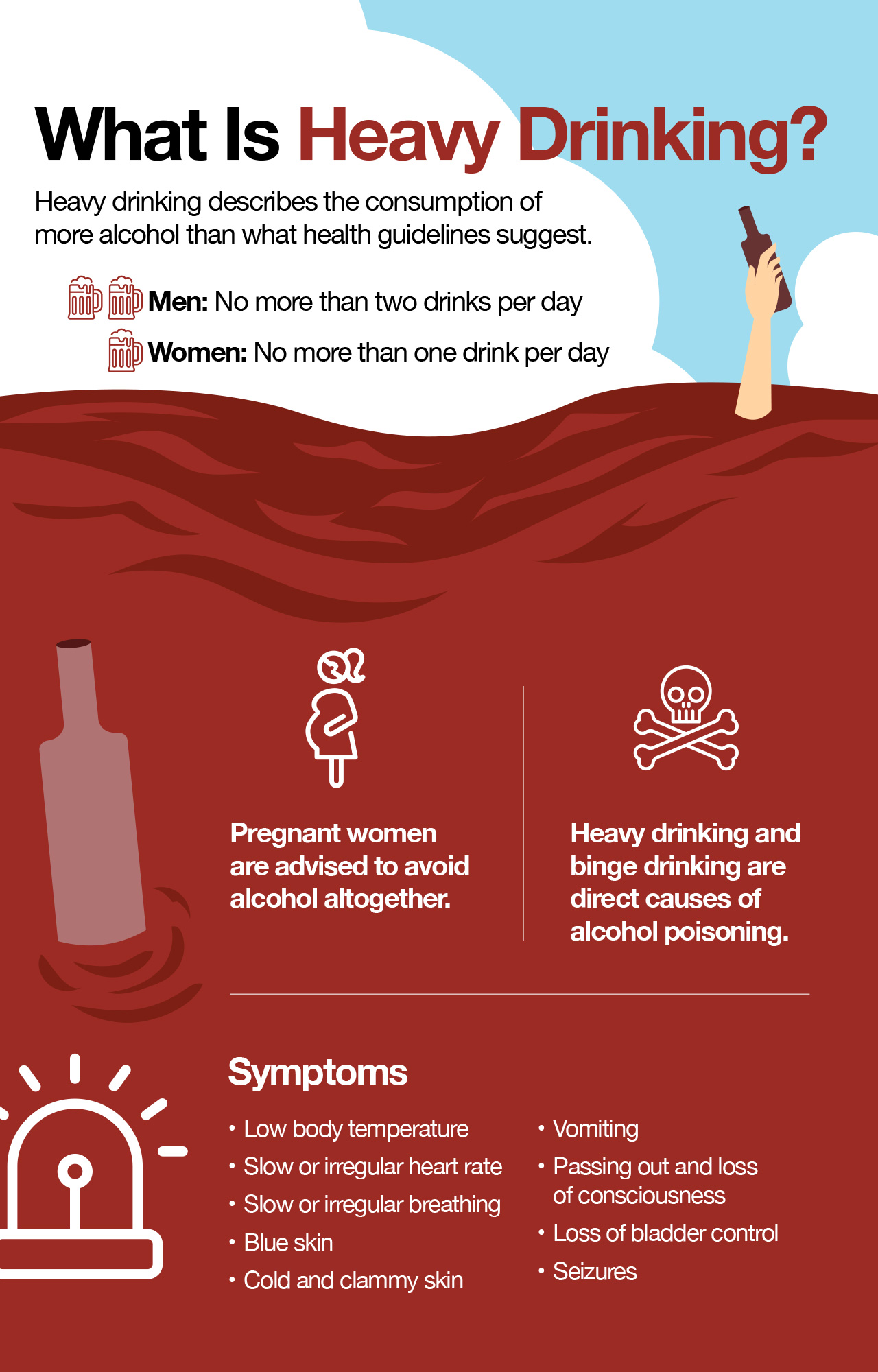Heavy drinking is detrimental to mental and physical health, and can even be life-threatening. Unfortunately, because alcohol is embedded in our social culture, binge drinking and excessive alcohol use have become normalized, despite the serious risk of alcohol poisoning and long-term damage. In this article, we go through what is considered heavy drinking and the impacts of heavy drinking on the body and mind. Read on to find out more.
Heavy Drinking Defined
Let’s first define what heavy drinking means. Health guidelines suggest that men should consume no more than two drinks per day, while women should consume no more than one drink per day. Pregnant women are advised to avoid alcohol altogether.
The liver is only able to process approximately one standard drink per hour. Consuming more than this or at a faster rate increases your blood alcohol levels rapidly. Heavy drinking describes the consumption of more alcohol than what health guidelines suggest. For example, this can mean consuming three or more drinks per day on a consistent basis.
Excessive alcohol use can also come in the form of binge drinking. Binge drinking means consuming many drinks on one occasion. For example, a college student might go out and drink six or more drinks in one evening. Even though this is socially normalized, this behavior is extremely unhealthy. Underage drinking is also rampant across the United States.
The National Institute on Alcohol Abuse and Alcoholism (NIAAA) presents shocking statistics on alcohol use in the United States. (1) In 2019, a quarter of adults over 18 reported binge drinking at some point in the past month. (1) And it is estimated that 95,000 people in the United States die each year from alcohol-related causes. (1) The Centers for Disease Control and Prevention (CDC) also provide helpful information on alcohol and its impact on public health. The Substance Abuse and Mental Health Services Administration (SAMHSA) also offers helpful information and resources.
Heavy Drinking Increases Your Risk of Alcohol Poisoning
Heavy drinking and binge drinking are direct causes of alcohol poisoning, which means that your blood alcohol concentration (BAC) has reached dangerously high levels.
Your blood alcohol concentration (BAC) is the amount of alcohol in your bloodstream at a given time. For example, a BAC of 0.02 indicates that per 100 milliliters of blood, there are 0.02 grams of alcohol. After one drink, an individual will have a BAC between 0.02 and 0.03.
However, excessive drinking can cause serious health risks and life-threatening symptoms. At a BAC As your BAC rises above 0.05, you will start noticing increased impairment and sedative effects of alcohol consumption. A BAC above 0.25 likely leads to alcohol poisoning.
Alcohol is classified as a depressant. This means that the active ingredient in alcoholic drinks, ethanol, suppresses central nervous system activity. The central nervous system can be thought of as the control center of the body, responsible for firing electrical signals When we drink alcohol, neurons don’t communicate as effectively or efficiently. As a result, messages travel much more slowly between the brain, nervous system, and the rest of the body. This can put your body at risk of shutting down.
Alcohol Poisoning Symptoms
What are the symptoms of alcohol poisoning? Let’s go through what signs and symptoms may arise when a person has ingested too much alcohol.
- Low body temperature
- Slow or irregular heart rate
- Slow or irregular breathing
- Blue skin
- Cold and clammy skin
- Vomiting
- Passing out and loss of consciousness
- Loss of bladder control
- Seizures
These symptoms constitute a medical emergency. A person in danger of alcohol poisoning may also show symptoms like:
- Loss of coordination
- Slurred speech
- Erratic behavior
- Poor decision-making
- Memory loss, or “blacking out”
- Severe dehydration
- Low blood sugar, or hypoglycemia
What to Do If You Think Someone Has Alcohol Poisoning
If you see someone who might have alcohol poisoning, it’s important to know what to do. For example, let’s say you are at a party and someone has had too many alcoholic drinks. The first steps are to check if the person is conscious. Do they respond to attempts to wake them? If not, the person requires medical attention immediately. Call 911.
It’s also important to ensure that the person is lying on their side or sitting upright. When a person is suffering the effects of alcohol overdose, their gag reflex is impaired and they are at risk of choking on their own vomit. By making sure the person is on their side or sitting up, you can help keep vomit out of the person’s airway.
You may also note other symptoms of alcohol poisoning. In any case, if you are worried about the person’s well-being, it’s important to seek medical attention immediately. Even if you are underage and are worried about getting in trouble, keep in mind that the consequences for not seeking help may be much more severe.
How Heavy Drinking Affects the Body Over Time
Acute alcohol consumption is extremely dangerous and even life-threatening. Drinking excessively over a long period of time can also wreak havoc on your internal organs, causing a range of health problems.
1. Liver Damage
Liver diseases are some of the most common ailments among heavy drinkers. The liver is susceptible to alcohol-induced damage. When we drink alcohol, it is absorbed through the stomach and sent to the liver for detoxification. The liver contains enzymes like cytochrome P450 that are responsible for breaking down toxins like ethanol into more manageable components that the body can safely excrete.
While the liver is a tough organ that is designed to process toxins, it is not invincible. The liver can process approximately one standard drink per hour, before ethanol gets backlogged in the bloodstream, waiting to be processed by the liver. Taking in more alcohol than the liver can handle leads to oxidative stress and inflammation in the liver. Continuous drinking can lead to a number of liver diseases:
- Fatty liver disease: Fatty liver disease is the earliest stage of liver disease as a result of chronic drinking. Also referred to as hepatic steatosis, this condition is characterized by the buildup of fat tissue in the liver. Fat particles infiltrate liver cells, which are also called hepatocytes. Continuous oxidative stress that alcohol causes can lead to malfunctioning metabolic processes and the accumulation of fat in the liver. Fatty liver disease often has no symptoms and can often be effectively reversed by stopping alcohol consumption, allowing the liver to heal.
- Alcoholic steatohepatitis: Alcoholic steatohepatitis represents fatty liver disease progression to the next stage. Steatohepatitis describes the presence of inflammation within liver tissue.
- Fibrosis: Untreated alcoholic steatohepatitis causes continuous inflammation and damage in the liver until fibrosis begins. Fibrosis is a process in which collagen and scar tissues begin to form in the liver. In particular, scar tissue begins to develop in the extracellular matrix surrounding hepatocytes.
- Cirrhosis: Cirrhosis develops after continued liver fibrosis and is characterized by hardened, scarred liver tissue. The areas of liver tissue that are scarred and hardened have lost function and can no longer help detoxify substances or carry out essential metabolic functions. Cirrhosis is a chronic disease that is difficult or impossible to reverse.
- Liver failure: End-stage liver failure occurs after many years of alcohol abuse and the progression of fatty liver disease to liver cirrhosis. Liver failure cannot be reversed and requires liver transplantation.
2. Heart Damage
Alcohol has significant impacts on the cardiovascular system. Because alcohol is a depressant, drinking excess alcohol can cause the heart to beat more slowly. Alcohol also causes the blood vessels to dilate. Combined with alcohol’s diuretic properties, blood vessel dilation can cause blood to accumulate in the legs.
Drinking too much alcohol can also damage the heart muscle and interfere with the heart’s normal electrical impulses, leading to heart arrhythmias that may be dangerous. Over time, drinking can also increase your risk of developing heart disease. Too much alcohol is detrimental if you have high blood pressure.
It’s important to note that in extremely high doses, alcohol can suppress the central nervous system to the point where you stop breathing and your heart stops beating. It’s important to regulate your intake of alcohol.
3. Hormonal Imbalance
Moderate drinking and heavy drinking can wreak havoc on hormonal health. Drinking excess alcohol can damage the endocrine system, which can have serious repercussions for the body’s homeostasis. A review published in Endocrinology & Metabolism Clinics of North America reveals the impact of alcohol use on the endocrine system. (2) The investigation shows that hormonal disturbances caused by alcohol consumption may contribute to reproductive dysfunction, thyroid imbalances, and disruptions in the stress response. (2)
4. Skin
We often take our skin for granted, because it’s the outermost part of the body. However, skin is the body’s largest organ and plays an important role in protecting the internal organs from infectious agents. Chronic alcohol consumption leads to severe dehydration, which wreaks havoc on skin health. Excess alcohol consumption can cause the skin to appear thin and dry.
5. Immune System Disturbances
When consumed in excess, alcohol is known to be an immune system suppressant. Normally, the immune system picks up on the presence of foreign invaders like viruses, bacteria, and other pathogens. When the immune system is functioning normally, it is able to fight off viruses and bacteria to prevent infection. In the presence of alcohol, the body is unable to efficiently fight off infection. In the days following a drinking episode, you may notice that you are more prone to feeling run down or getting sick.
However, when immune system activity is suppressed, the body is more vulnerable to infection. Chronic excess drinking may even cause inflammation that increases the risk of autoimmune disorders.
6. Digestive Issues
Alcohol can also have a negative impact on the digestive system. First, drinking large amounts of alcohol can cause inflammation within the digestive tract. This can cause uncomfortable symptoms like acid reflux, burning, and stomach pain. Alcohol also changes the composition of the microbiome, potentially wiping out healthy strains of bacteria. The result of an imbalanced microbiome is increased inflammation in the body.
Moreover, chronic alcohol consumption can inhibit the normal absorption of nutrients like carbohydrates, protein, fat, and B vitamins. Alcohol causes inflammation in the small intestine that prevents the normal absorption of both macronutrients and micronutrients. Severe malnutrition from alcohol consumption can cause Wernicke Korsakoff syndrome or wet brain syndrome.
7. Muscle Health
Having lean muscle mass is critical for supporting a healthy metabolism as well as overall strength and well-being. However, excess alcohol consumption can impede muscle growth and maintenance. In a randomized study published in PLoS One, researchers evaluated the impact of alcohol consumption on muscle synthesis in 8 males. (3) Results revealed that alcohol consumption was linked to a lower rate of myofibrillar protein synthesis. (3)
Alcohol-induced liver cirrhosis is also linked to unhealthy weight loss and muscle wasting. When the liver is damaged, the body has a difficult time carrying out metabolic processes for storing and utilizing energy.
Muscle wasting can contribute to a sluggish metabolism, higher risk of injury, and lower quality of life.
How Heavy Drinking Affects the Brain
Alcohol impacts the brain and can have many mood and cognitive repercussions.
1. Depression
Depression is commonly associated with high alcohol consumption. Individuals with depression may be more inclined to drink alcohol in excess in an effort to numb the pain and escape from reality.
Although alcohol consumption does not necessarily cause depression, it can exacerbate underlying depression or mental illness. In individuals with unipolar depression, alcohol may temporarily provide relief, while exacerbating depressive symptoms in the long term. In individuals with bipolar disorder, alcohol consumption may trigger a depressive episode.
Alcohol use often exacerbates underlying depression because of its impact on neurotransmitters and nervous system function. In addition to the impact on neurotransmitters and other body functions, alcohol also increases inflammation and oxidative stress in all body systems. The brain is particularly vulnerable to oxidative stress, which describes the buildup of waste material that inhibits cells from functioning normally. Oxidative stress in the brain can interfere with normal brain transmissions and worsen anxiety and depression.
2. Anxiety
Individuals with anxiety may be more prone to reach for a drink, because of alcohol’s soothing effects. However, chronic alcohol consumption may disrupt the careful balance of inhibitory and excitatory neurotransmission. Inhibitory processes calm the mind, while excitatory processes activate the mind. Long-term, chronic alcohol consumption has negative effects on the functions of neurotransmitters like gamma-aminobutyric acid (GABA), dopamine, serotonin, and their receptors. (4)
Throughout the duration that the body is intoxicated with alcohol, most body processes are suppressed. Heart rate is lower, breathing slows, and adrenaline activity is lowered. These effects are one of the main reasons why many of us may reach for a drink after a stressful day at work. However, these same anxiolytic effects also contribute to an increase in anxiety after alcohol consumption has stopped.
Once alcohol wears off, a rebound effect can occur, causing anxiety levels to skyrocket. Your heart may race and you may feel shaky and sweaty. These common symptoms of a hangover are closely connected to anxiety, and can worsen panic, racing thoughts, and fear. Hangover symptoms are also comparable to alcohol withdrawal symptoms, which may include agitation, irritability, extreme anxiety, tremors, shakiness, and in severe cases, seizures.
3. Memory Impairment
You may know that acute binge drinking can lead to memory loss during intoxication. Excess alcohol consumption over time can be connected to memory impairment. Drinking excess alcohol slows down cognitive functioning and inhibits neurotransmitter activity. Moreover, oxidative stress from alcohol consumption leads to the buildup of waste products in the brain. When consumed in large amounts, alcohol can deprive the brain of oxygen, leading to brain cell death.
4. Hepatic Encephalopathy
Hepatic encephalopathy is a consequence of severely impaired liver function as a result of alcohol abuse. When alcohol-induced liver damage has reached late-stage cirrhosis, the liver is no longer able to carry out its normal functions. As a result, toxins that would normally be processed and filtered remain in the bloodstream, where they can travel to other areas of the body, including the brain. Hepatic encephalopathy causes serious symptoms like anxiety, confusion, and seizures.
Things to Keep in Mind
Binge drinking and engaging in heavy drinking are dangerous habits and may mean that you have alcohol use disorder and alcohol dependence. Signs may include the inability to stop drinking and withdrawal symptoms when you go a certain period of time without drinking alcoholic beverages. If you think you may be struggling with alcohol abuse disorder or you are worried about your drinking habits, it’s crucial to seek help from your primary care physician and mental health care providers. Effective treatment can help you restore your health and well-being.
Key Takeaways: What Is Considered Heavy Drinking?
What is considered heavy drinking? Heavy drinking describes the excessive intake of alcohol. Heavy drinking increases your risk of alcohol poisoning and results from the excessive consumption of alcohol in a short period of time. Alcohol poisoning is a medical emergency, and requires immediate medical attention. Heavy drinking over a long period of time is a substance abuse disorder and can lead to negative health effects. Heavy drinking leads to an increased risk of damage to the liver, heart, brain, and other organ systems. If you or a loved one is engaging in heavy drinking, it’s important to seek help.

References:
(1) https://www.niaaa.nih.gov/publications/brochures-and-fact-sheets/alcohol-facts-and-statistics
(2) https://www.ncbi.nlm.nih.gov/pmc/articles/PMC3767933/























